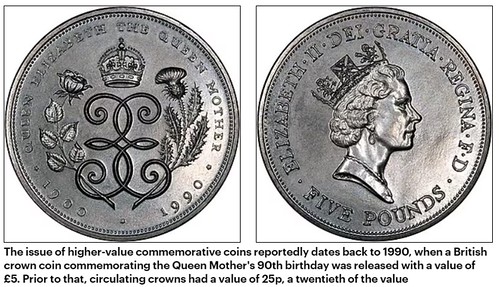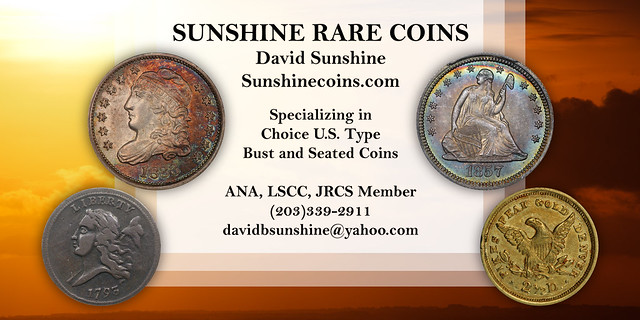
PREV ARTICLE
NEXT ARTICLE
FULL ISSUE
PREV FULL ISSUE
CAN I PAY THE TAXMAN IN COMMEMORATIVE COINS?Dick Hanscom passed along this Daily Mail article about the quandary of spending "legal tender" commemorative coins. -Editor Back in 2015, I bought some commemorative Winston Churchill £20 and Buckingham Palace £100 coins from the Royal Mint, thinking that they were legal tender so the value could only ever increase. That might be technically true, but that's only as good as my ability to actually spend or deposit them. I've tried depositing them at a couple of banks, but they've all refused. I've tried paying Vehicle Excise Duty with them at the Post Office, but they also refused payment. I've heard some reports of people spending £20 coins by filling up with fuel, but I can't get up to £100 to spend those coins given the size of my car's fuel tank, and I'm not very keen on making myself unwelcome at the fuel station. I have a hefty HMRC tax bill coming up for the 2020-21 tax year, and it feels like I ought to be able to pay off some of that with these coins, but I can't work out any way to actually pay HMRC in cash. At this point, I'm sort of resigned to just selling the coins on eBay, for probably less than their face value. Does anyone have any more cunning ideas? – via Reddit George Nixon, This is Money, replies: At This is Money, our award-winning coin coverage tends to focus on loose change which actually enters into circulation. Largely, this is because they can't simply be bought and therefore have added value based on their scarcity and the essential 'luck of the draw' of getting them. But there is another kind of coin you do buy deliberately and has a monetary value on it: the commemorative coin. However, five years ago we also broke the news the Mint had launched a crackdown on the acceptance of special, high-value commemorative coins advertised as 'legal tender'. As we reported, the Mint told banks in a letter that commemorative '£20, £50 and £100 coins are issued for commemorative purposes only and are not intended to be used as cash. 'Members should not accept the coins at bank branches and customers who wish to return the coins should be referred to the Royal Mint.' This came as we reported on how one of our readers, James, had an air mile-earning wheeze come unstuck, which left him with £29,000 worth of commemorative coins that HSBC wouldn't let him cash. He had been buying them on a points-earning credit card - to rack up rewards - cashing in the coins and then paying off the balance, before the scheme was brought to an abrupt end. The confusion largely stems from the central issue of 'legal tender', which many people tend to equate with 'able to be accepted in shops'. This is not the case. 'In practice this means that although the silver UK coins we produce in denominations of £5, £20, £50 and £100 are approved as legal tender, they have been designed as limited edition collectables or gifts and will not be entering general circulation. As such, UK shops and banks are unlikely to accept them.' Currently, the Mint offers a £5 coin commemorating the English king Alfred the Great, which it is selling for £13. While it is legal tender, this does not mean that it can be put in your wallet, taken into a shop and used to pay for anything, and banks will not take them over the counter. According to Phil Mussell, from Coin News magazine, which works with the Mint, the issue with this reportedly dates back to 1990. At that point, commemorative British crowns released to celebrate the Queen Mother's 90th birthday changed from having a value of 25p to one of £5. Banks began 'getting jittery about this', Phil said, and even though the Mint issued no guidance about this at the time, it subsequently got 'fed up of having these £5 coins sent back to them'. After all, he added, 'the Royal Mint is a private company, it's in the business of selling coins not buying them back.' The same situation applies to uncirculated commemorative 50p, £1 and £2 coins, as well as higher-value pieces which have no circulating equivalent. But all is not lost for the Reddit user. -Editor But Phil believes you have missed a trick. Although you state: 'I'm sort of resigned to just selling the coins on eBay, for probably less than their face value, so significantly less once eBay fees have been taken into account', that might not be the case. He said: 'You'd be a fool to cash them in for £100. The vast majority of these coins are worth more than their face value, largely as many of them are made of gold.' The £20, which you said was a 2015 silver coin featuring Winston Churchill, was issued just 200,000 times, according to Chards. For comparison's sake, that is scarcer than the rarest circulating 50p around, the 2009 Kew Gardens coin, which can sell for over £100 at times. More recently, five Alfred the Great £5 coins have sold for £14.50, according to eBay. As a result, Phil said simply, 'My advice would be to sell them on the collector market.'
To read the complete article, see:
Coincidentally, CoinsWeekly recently published an article about the British Indian Ocean Territory and payments in legal tender collector coins. -Editor
To read the complete article, see:
Wayne Homren, Editor The Numismatic Bibliomania Society is a non-profit organization promoting numismatic literature. See our web site at coinbooks.org. To submit items for publication in The E-Sylum, write to the Editor at this address: whomren@gmail.com To subscribe go to: https://my.binhost.com/lists/listinfo/esylum All Rights Reserved. NBS Home Page Contact the NBS webmaster 
|

